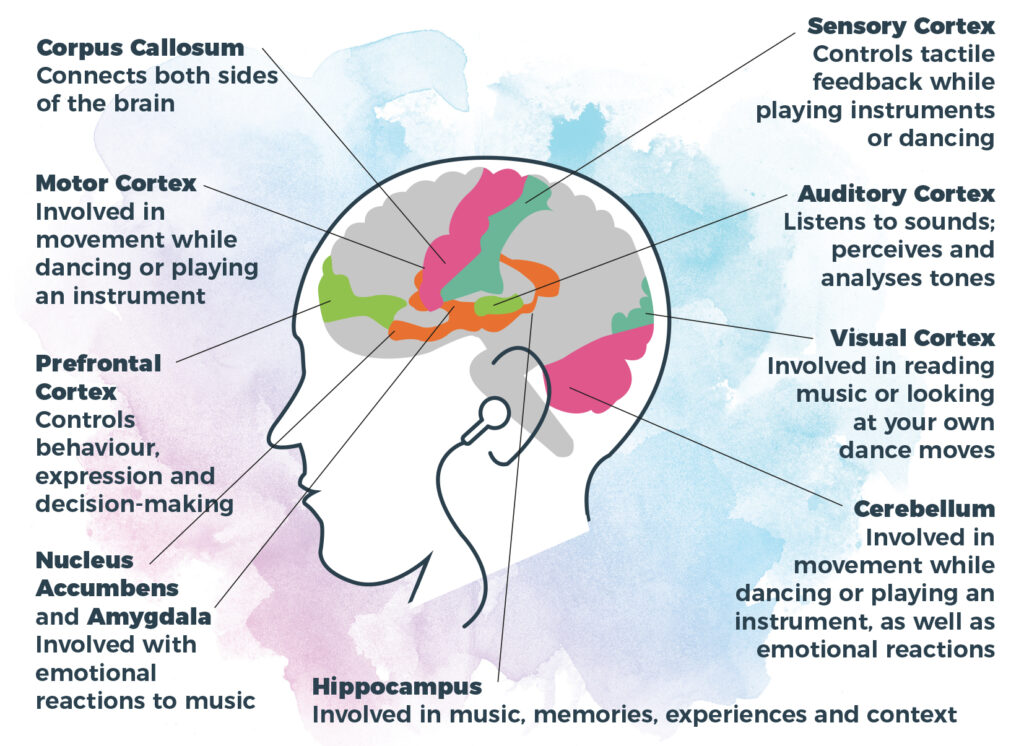This page should be used alongside the Integrating Playlist for Life into Care workbook.

1. Listening to a personal playlist can
1.2 A little bit about the science
Music is special. It stimulates many parts of the brain at once. Even if one part of the brain is damaged, music can still reach other parts (11,12)

1.3 Musical effects – how many ring a bell with you?
There is more and more research into the special effects music can have. How many of these do you recognise from your own life and experience?
Music can relieve pain – Surgery patients have reported up to four times reduction in post-surgical pain when listening to music (13)
Music can change your mood – Music stimulates the parts of your brain connected to ‘pleasure’ (14)
Music can make you healthier – Calming music decreases blood pressure, steadies the heart rate and eases stress. There is also preliminary evidence that suggests music can boost the immune system by cutting stress hormones and boosting growth hormones (15)
Music can distract and command attention – Familiar music commands attention. That is why adverts use hit tunes – to win you back when you’ve gone to put the kettle on. In the training you will get a chance to experience this.
1.5 The Gerdner protocol
Professor Linda Gerdner at Stanford University has spent more than 20 years researching the ways personal music can help people living with dementia. She has developed a protocol – or way of doing things – that shows how to find the right music and then how to schedule listening to it to reduce:
You can find the full Gerdner Protocol online. Simply search for ‘Gerdner Protocol 5th Edition’. It should be one of the top results and is called ‘Evidence-Based Guideline: Individualized Music for Persons with Dementia (5th Edition)’(16)
1.6 Benefits of personal playlists
Benefits for people living with dementia
Benefits for families
Benefits for staff members
Benefits for volunteers
Further reading
In addition, we have listed various academic research outcomes to underline the benefits of personally meaningful music for people living with dementia below. Furthermore, you can access this regularly updated bibliography of academic research into music and dementia.
1. Bufalini J, Eslinger P, Lehman E, George DR. Effects of a Personalized Music Intervention for Persons with Dementia and their Caregivers. J Alzheimers Dis Rep. 6(1):43–8.
Playlist for Life, Suite 419, The Pentagon Centre, 36 Washington Street, Glasgow G3 8AZ
© 2022 Playlist For Life. All rights reserved. Registered charity: SC044072
| Cookie | Duration | Description |
|---|---|---|
| __stripe_mid | 1 year | We use Stripe to provide payment services on our website to allow us to take donations. Stripe sets this cookies to allow payments to be taken and to provide fraud protection. |
| __stripe_sid | 30 minutes | We use Stripe to provide payment services on our website to allow us to take donations. Stripe sets this cookies to allow payments to be taken and to provide fraud protection. |
| AWSALBTG | 7 days | This is a cookie used by AWS, which hosts our website, to provide load-balancing functions. Load balancing refers to the practice of monitoring the volume of requests that come in and pulling in more computing power when needed. This ensures the website doesn't slow down when lots of people are viewing. |
| AWSALBTGCORS | 7 days | This is a cookie used by AWS, which hosts our website, to provide load-balancing functions. Load balancing refers to the practice of monitoring the volume of requests that come in and pulling in more computing power when needed. This ensures the website doesn't slow down when lots of people are viewing. |
| CONSENT | 2 years | We use a system called reCaptcha provided by Google to ensure that only humans can complete some forms on our site. This cookie is set by Google to ensure the reCaptcha system can work. |
| cookielawinfo-checkbox-analytics | 11 months | This cookie is set by GDPR Cookie Consent plugin. The cookie is used to store the user consent for the cookies in the category "Analytics". |
| cookielawinfo-checkbox-functional | 11 months | The cookie is set by GDPR cookie consent to record the user consent for the cookies in the category "Functional". |
| cookielawinfo-checkbox-necessary | 11 months | This cookie is set by GDPR Cookie Consent plugin. The cookies is used to store the user consent for the cookies in the category "Necessary". |
| cookielawinfo-checkbox-others | 11 months | This cookie is set by GDPR Cookie Consent plugin. The cookie is used to store the user consent for the cookies in the category "Other. |
| cookielawinfo-checkbox-performance | 11 months | This cookie is set by GDPR Cookie Consent plugin. The cookie is used to store the user consent for the cookies in the category "Performance". |
| elementor | never | We use a system called Elementor to design the pages on our website. This cookie is used by Elementor to show you webpages. |
| NID | 6 months | We use a system called reCaptcha provided by Google to ensure that only humans can complete some forms on our site. This cookie is set by Google to ensure the reCaptcha system can work. |
| viewed_cookie_policy | 11 months | The cookie is set by the GDPR Cookie Consent plugin and is used to store whether or not user has consented to the use of cookies. It does not store any personal data. |
| vuid | 2 years | We use Vimeo to allow us to play videos to you as part of our training on this site. This cookie is set by Vimeo to allow our films to be displayed. |
| wc_fragments_[] | Never | We use a system called WooCommerce to provide the functionality to sell our courses to you online. This cookie manages the shopping basket and your shopping session when you use our site. |
| woocommerce_cart_hash | Session | We use a system called WooCommerce to provide the functionality to sell our courses to you online. This cookie manages the shopping basket and your shopping session when you use our site. |
| woocommerce_items_in_cart | Session | We use a system called WooCommerce to provide the functionality to sell our courses to you online. This cookie manages the shopping basket and your shopping session when you use our site. |
| wordpress_logged_in_[] | 2 weeks | If you have an account on our website and you log into that account then this cookies will be set. It allows us to identify that you are logged in and to give you access to member-only pages. |
| wordpress_sec_[] | 2 weeks | If you have an account on our website and you log into that account then this cookies will be set. It allows us to identify that you are logged in and to give you access to member-only pages. |
| wp_woocommerce_session_[] | 2 days | We use a system called WooCommerce to provide the functionality to sell our courses to you online. This cookie manages the shopping basket and your shopping session when you use our site. |
| Cookie | Duration | Description |
|---|---|---|
| _ga | 2 years | This cookie is used to collect information about how visitors use our website. We use a system called Google Analytics to do that. We use the information to compile reports and to help us improve the website. This and the other Google Analytics cookies collect information in a way that does not directly identify anyone, including the number of visitors to the website and blog, where visitors have come to the website from and the pages they visited. |
| _ga_V0Z0H3HMCT | 2 years | This cookie is used to collect information about how visitors use our website. We use a system called Google Analytics to do that. We use the information to compile reports and to help us improve the website. This and the other Google Analytics cookies collect information in a way that does not directly identify anyone, including the number of visitors to the website and blog, where visitors have come to the website from and the pages they visited. |
| _gid | 1 day | This cookie is used to collect information about how visitors use our website. We use a system called Google Analytics to do that. We use the information to compile reports and to help us improve the website. This and the other Google Analytics cookies collect information in a way that does not directly identify anyone, including the number of visitors to the website and blog, where visitors have come to the website from and the pages they visited. |
